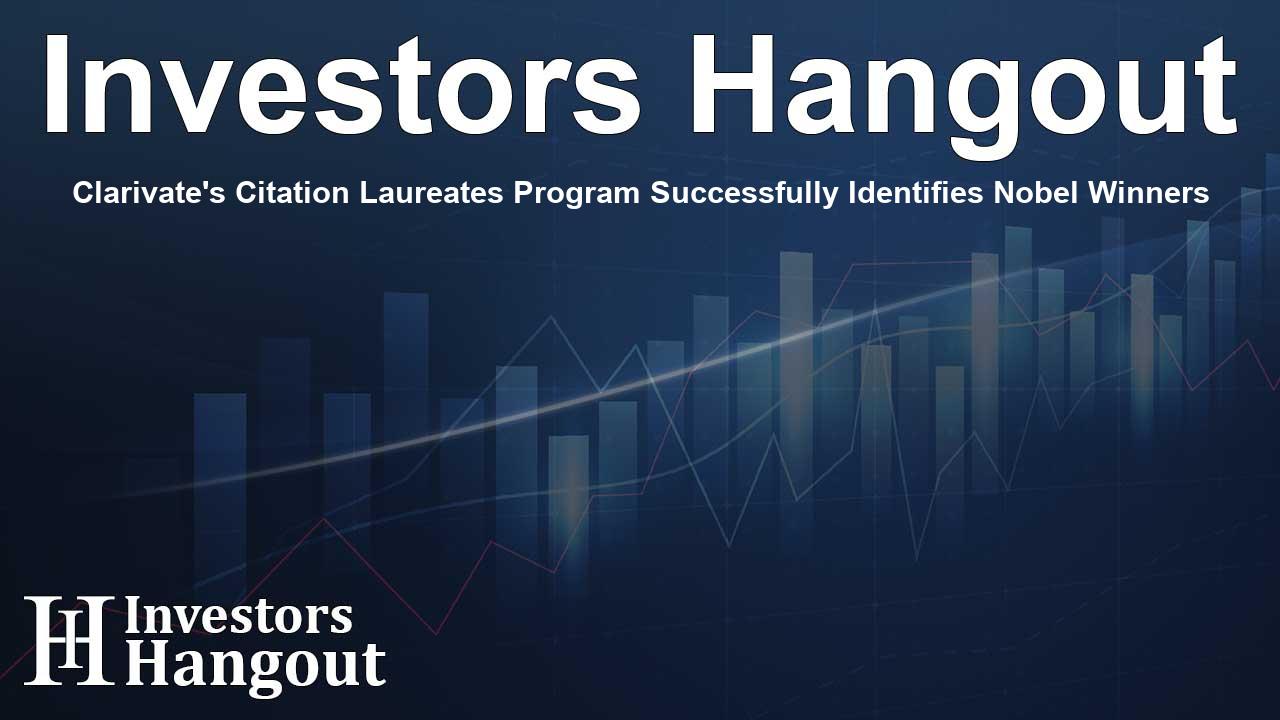Clarivate's Citation Laureates Program Successfully Identifies Nobel Winners

Clarivate's Remarkable Achievement in Nobel Prize Predictions
In an outstanding demonstration of its analytical prowess, Clarivate Plc (NYSE: CLVT) has successfully predicted the 2024 Nobel Prize winners through its esteemed Citation Laureates Program. This program has gained recognition since 2002 for accurately forecasting Nobel laureates based on citation analysis, emphasizing the significant contributions of researchers worldwide.
Insights into the Data-Driven Approach
The Citation Laureates Program relies on data from the Web of Science Core Collection™, employing rigorous citation analysis and qualitative insights to identify researchers with exceptional contributions to their fields. This methodology allows Clarivate to forecast potential Nobel laureates effectively—whether well in advance or shortly before the announcements.
The Legacy of Citation Laureates
Since its inception, the Institute for Scientific Information (ISI) at Clarivate has recognized 441 researchers as Citation Laureates, with 83 subsequently earning a Nobel Prize. Notable successes began in 2007, when the ISI accurately predicted laureates annually. This year, among the prominent names was a group of researchers celebrated shortly before receiving the prestigious awards.
This Year’s Notable Citation Laureates
Among the eight new Nobel Prize recipients identified by Clarivate’s Citation Laureates Program are Victor Ambros and Gary Ruvkun, who received the Nobel Prize in Physiology or Medicine for their pioneering discovery of microRNA and its critical role in gene regulation. Their impactful work, first recognized by ISI in 2008, has reshaped current understandings of biological processes.
Groundbreaking Contributions in Chemistry
This year's Nobel Prize in Chemistry was awarded to David Baker, Demis Hassabis, and John M. Jumper for their innovative research into protein structure prediction and computational protein design. The accolades signal the importance of artificial intelligence in research domains, particularly with Hassabis and Jumper's landmark AlphaFold paper, which has been cited rapidly and widely since its publication.
The Economic Sciences Prize and Its Laureates
Furthermore, the Sveriges Riksbank Prize in Economic Sciences was awarded to Daron Acemoglu, Simon Johnson, and James A. Robinson, all of whom were previously highlighted by the ISI in 2022. Their influential studies explore institutional formation and its impacts on global prosperity.
Expert Commentary on the Prediction Process
David Pendlebury, Head of Research Analysis at ISI, shared insights into the prediction process, emphasizing the bold choices made by Nobel committees and the recognition of AI's transformational role in academia. He noted the statistical significance of their groundbreaking papers, highlighting the unprecedented speed at which they garnered citations.
Looking Ahead: The Future of the Citation Laureates Program
As Clarivate continues to enhance its strategies for identifying potential Nobel laureates, it remains committed to its mission of providing transformative intelligence through enriched data, insights, and expert analytical solutions. The foundation for future success lies in this commitment, further bolstered by their innovative methodologies.
Clarivate's Ongoing Impact on Research and Academia
As a global leader in transformative intelligence, Clarivate provides researchers, academics, and industries with the data and insights necessary to drive innovation and address complex global challenges. Their ongoing efforts ensure that the impact of research is recognized and celebrated.
Frequently Asked Questions
What is the Citation Laureates Program?
The Citation Laureates Program is an initiative by Clarivate that identifies potential Nobel Prize winners based on citation excellence and expert analysis of their research impact.
How many researchers have been named Citation Laureates?
Since 2002, the program has identified 441 researchers as Citation Laureates, with 83 eventually receiving a Nobel Prize.
Why is Clarivate’s prediction significant?
Clarivate’s predictions are significant as they use a rigorous data-driven approach, combining citation metrics with expert analysis, reinforcing the reliability of their findings.
Who were the 2024 Nobel Prize recipients identified by Clarivate?
The 2024 Nobel Prize recipients include Victor Ambros, Gary Ruvkun, David Baker, Demis Hassabis, John M. Jumper, Daron Acemoglu, Simon Johnson, and James A. Robinson.
What role does AI play in Clarivate’s analysis?
AI enhances Clarivate’s ability to analyze vast datasets and identify emerging trends, making their predictions more accurate and timely.
About The Author
Contact Hannah Lewis privately here. Or send an email with ATTN: Hannah Lewis as the subject to contact@investorshangout.com.
About Investors Hangout
Investors Hangout is a leading online stock forum for financial discussion and learning, offering a wide range of free tools and resources. It draws in traders of all levels, who exchange market knowledge, investigate trading tactics, and keep an eye on industry developments in real time. Featuring financial articles, stock message boards, quotes, charts, company profiles, and live news updates. Through cooperative learning and a wealth of informational resources, it helps users from novices creating their first portfolios to experts honing their techniques. Join Investors Hangout today: https://investorshangout.com/
The content of this article is based on factual, publicly available information and does not represent legal, financial, or investment advice. Investors Hangout does not offer financial advice, and the author is not a licensed financial advisor. Consult a qualified advisor before making any financial or investment decisions based on this article. This article should not be considered advice to purchase, sell, or hold any securities or other investments. If any of the material provided here is inaccurate, please contact us for corrections.
